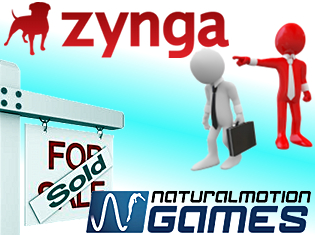 Struggling social games developer Zynga continued its slide in Q4 2013, but in an indication of how bad things have got for the company, the fact that its slide wasn’t as steep as had been expected was enough to send its stock up over 20% in after-hours trading. Zynga closed out Thursday’s trading at $3.56, but after-hours moves have boosted it to around $4.25, although that’s still less than half its IPO price from December 2011.
Struggling social games developer Zynga continued its slide in Q4 2013, but in an indication of how bad things have got for the company, the fact that its slide wasn’t as steep as had been expected was enough to send its stock up over 20% in after-hours trading. Zynga closed out Thursday’s trading at $3.56, but after-hours moves have boosted it to around $4.25, although that’s still less than half its IPO price from December 2011.
Zynga’s Q4 revenue came in at $176.4m, down 43% from the same period a year ago. Online game revenue fell 44% to $152m, while ad revenue fell 35% to $24m. However, the company’s losses also fell from $48.5m in Q4 2012 to $25.2m, suggesting the aggressive cost-cutting moves made over the past year were at least helping to staunch the flow of blood.
Zynga Poker accounted for 21% of Q4’s online game revenue, second only behind Farmville 2 on the list of Zynga star products. Zynga Poker‘s share of the revenue pie was up from 19% in Q3 2013, marking the product’s first sequential growth in 18 months. Zynga said its investments in products like Zynga Casino were “beginning to bear fruit” but it’s unclear if this included Zynga’s real-money gambling operations in the UK.
Bookings, the sale of virtual goods to Zynga players, fell 44% year-on-year to $146.5m. Average daily bookings per daily average user rose from 5.1¢ to 6¢ in Q4, but the number of monthly unique payers plummeted to 1.3m, down from 2.9m last year and down from 1.6m in Q3 2013. So those willing to pay to play are paying more, but their ranks are thinning rapidly.
For the year as a whole, revenue fell 32% to $873.2m, with online game revenue down 34%, ad revenue down 17% and bookings down 38% to $716.1m. Net losses for the year narrowed to $37m from $209.4m in 2012. Zynga ended the year with $1.54b in cash and equivalents, down from $1.65b at the end of 2012.
Looking forward, Zynga expects Q1 2014 revenue of between $155m to $165m, with a net loss projected at between $56m and $49m. The company’s cost-cutting moves will continue in 2014, with plans to jettison another 15% of its workforce (around 314 employees), with resulting pre-tax savings of around $34m.
Zynga’s in-house creativity drought was further emphasized by the news that it planned to spend $527m to acquire UK-based mobile game and technology developer NaturalMotion, the folks behind iOS hit titles Clumsy Ninja and CSR Racing. The privately held NaturalMotion’s owners will receive $391m in cash and 39.3m Zynga shares, while Zynga expects the deal will add $70m to $80m to 2014’s bookings and between $15m and $25m in earnings.
Zynga CEO Don Mattrick said the pricey acquisition was “the right step at the right time” and would “significantly expand our creative pipeline [and] accelerate our mobile growth.” It remains to be seen whether Mattrick’s deal-making will prove any more savvy than his predecessor, Mark Pincus, who infamously paid $200m for Draw Something developers OMGPOP in 2012, only to shut down the studio just a year later.
